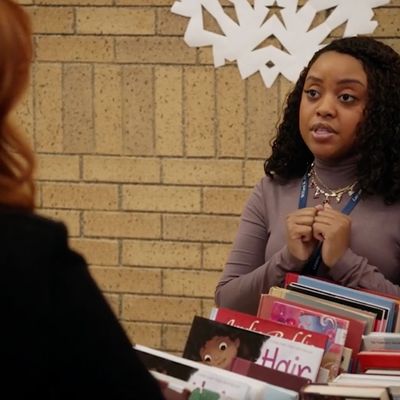
Abbott Elementary has successfully combined the excitement of week-to-week TV with the sort of longform storytelling that gets a massive fan base invested. I can’t log on to Twitter without encountering at least one post about Ava’s one-liners or Gregory and Janine’s slow-burning romance. (It’s now been almost a month since the last episode aired, and people have been talking about Janine and Gregory’s dance for weeks.) Abbott also hits on something we’re all susceptible to: nostalgia. Going to school — and all the growing pains that come with it — is a virtually universal experience that transcends demographics. It’s hard for the average person not to see themselves reflected in a character or story line, even if it’s only for a moment, and I think a lot of people can see themselves in Melissa and Mya’s story.
At Abbott Elementary, the Read-A-Thon is an annual school-wide competition that tracks which classroom can read the most books. Although everyone is a winner and will receive a pizza party at the end, the (actual) winning classroom earns bragging rights and possession of the prized Read-A-Thon belt. Melissa has won the competition two years in a row, but Janine is determined to break her streak. She creates a reading oasis in her classroom after figuring out how to fit two math lessons in one week so her students can focus on getting through as many books as possible. Melissa revs up her class when she sees how much effort Janine is putting into the competition and calls on her three strongest readers to push them to the finish line. She advises that they read at any chance they can no matter where they are… including the bathroom. This leads to her top readers being sent home with pink eye. Now she’s lost her star players, whose reading makes up for some of the stragglers. One of which is Mya, the sweetest little girl who struggles with reading but wants to do anything to help her room win.
Inspired by Melissa’s fervent encouragement, Mya begins to fabricate her reading logs, claiming to have read 25 books in one night. She says she’s read ten Berenstain Bears books, but when Melissa asks her the name of one of the characters, Mya says Beyoncé. Melissa calls Mya’s parents in to talk about their daughter’s progress, but they deny that she lied about how many books she read, assuring her that Mya is a star reader. Pointing out that none of her students could read that many books in one day, Melissa goes on to tell them that Mya has been displaying signs of difficulty with reading. She suggests getting Mya tested for learning disabilities, something that they vehemently refuse, offended at the idea that there could be something “wrong” with their child.
Melissa, however, knows that conditions like dyslexia don’t mean someone is any bit less intelligent or capable of learning … they simply learn in a different way. After the competition concludes, Melissa shares a moment with Mya proving just that. She asks Mya if reading can be challenging, and admits it can even be hard for her sometimes. Gifting Mya a book that was once hers when she was a young girl, Melissa shows Mya how highlighting the first few letters of a word keeps the text from turning into alphabet soup in her mind.
I loved this episode, not only because Melissa and Mya’s scene brought a tear to my eye, but because the hill I’m most willing to die on is encouraging and supporting literacy. Like Sir Levar Burton (I cracked up when Janine called him that) once said, “If you can teach a child to read in at least one language, they have the opportunity to become a lifelong learner. And a lifelong learner is someone who will never finish the job of self-educating.” I’m pretty sure I came out of the womb holding a library card, and the skill has taken me places bigger than I ever dreamed, including writing these words right now. But that kind of passion for reading is becoming increasingly rare. In 2021, a Pew Research survey found that about 25 percent of American adults said they hadn’t even partially read (or listened to) a book in the past year. This statistic has nearly tripled since the 1970s. Add this to the overwhelming amount of students who get left behind because their brains don’t fit the cookie-cutter mold American schools celebrate, and it’s no surprise people don’t want to read. More than half of American adults read below a sixth-grade level, and we reap the consequences of this literacy crisis every day.
Jacob’s podcast club is a great example of the shifting media landscape as more people look to mediums outside of reading for their news and entertainment. In Jacob’s mind, he’s going to produce an Ira Glass–inspired podcast that will “redefine journalistic storytelling.” Gregory signs on to help with the club, since he found out that teachers get paid more when they do an extracurricular. Two students, Clarence and Raheem, sign up for the club, and it’s obvious that a culture clash is brewing. While Jacob takes inspiration from podcasts like This American Life, Pod Save America, and The Daily, Clarence and Raheem are more interested in Joe Budden or The Breakfast Club. Jacob is so far removed from their culture that he believes Joe Budden is a mispronunciation of Joe Biden, and his students think Ira Glass is an inanimate object (their faces when Jacob mentioned pregnant pauses were on point).
For their first episode, titled “Cafeteria Blues,” the two students begin doing what they see on every popular podcast in their lives: shit talking and gossiping in front of a microphone. Jacob is appalled and asks them to “rein it in,” but the students say his podcast recommendations are like “listening to school.” He takes it upon himself to edit the audio into his idea of a worthy episode, causing the students to accuse him of censorship — a word that’s basically a slur to the proud leftist Jacob — and they quit.
Ava remains the unexpected voice of reason this season, and when Jacob talks to her about the status of the club, she asks him if he was presenting them with something new and exciting or merely forcing them to do what he wanted to do. He takes this advice to heart and records a new episode with the club. This story line reminds me of some of the difficulties I face as a college-level instructor. I teach a course called Media, Power, and Culture in the journalism department of the university, so I have a lot of thoughts surrounding the influx of podcasts and blogs as a form of seemingly credible news sources. When most of the population has a sixth-grade reading level, how can we expect people to have media literacy? I’m constantly trying to engage my students in a way they find entertaining while also giving them the skills to differentiate gossip from fact and teach them how a lot of these “thought leaders,” Joe Budden included, often perpetuate their own harmful conscious and unconscious bias and have no real journalistic training. Basically, I feel Jacob’s pain, but I agree with Ava. It’s more important to adjust our methods of teaching to this new age than to force students to do something they can’t relate to. It is possible to find a happy medium.
However, when tea needs to be spilled, tea needs to be spilled. For the next episode of the podcast, Janine is the featured guest. This is her punishment for losing the Read-A-Thon to Melissa. Although it seemed at first that Janine won, Melissa reread the rules and realized that the winner is determined by how many books are read in one classroom. Since her class is second and third grade combined, she was able to add their scores together and beat Janine. So Janine sits down with the podcast club for an interview and Clarence and Raheem waste no time. Apparently, Clarence’s mother saw Janine and Gregory dancing at the club, so they pry for answers. They even say Clarence’s mom witnessed them leaving together, a statement that prompts Janine to explain that she was outside talking to Gregory’s friend Maurice … which is news to Gregory. Gregory tries to stop the recording, but Jacob says he wants to hear more for “journalistic purposes.” And I concur: a good journalist always asks follow-up questions, no matter the podcast.
Teacher’s Notes
• Janine really is Ms. Frizzle. When she skipped into the scene right after Barbara described her, I couldn’t unsee it. If Janine could herd all of her students into a school bus to embark on a magical adventure that always ends with a lesson, she would’ve done it already.
• Gregory is the perfect character for the podcast club. His look to the camera as Jacob is introduced to Joe Budden was *chef’s kiss*, and his sound effects were the icing on the cake. Also, is a breakup on the way? Amber clearly likes a man with some cash in his pocket, and a teacher’s salary leaves much to be desired.
• Can we please get one episode of Ava’s podcast Small Deck Energy?
• And, of course, here are some of the best lines of the episodes:
Barbara: “The only club I go to is Bible Club.”
Ava, responding to Barbara: “Do they play good music in there? My favorite club got shut down ’cause they let a horse in there.” (Love the Bianca Jagger Studio 54/Beyoncé Renaissance reference.)
Melissa to Janine, standing at full height: “How long have you been sitting there?”
Ava, describing Janine and Gregory’s dance in the last episode: “It was a Disney Channel grind at best.”
Jacob: “I wanted to be like Sarah Koenig, a graceful hand to hold through gripping stories. Instead, I tried to force my agenda onto impressionable listeners … I Rogan’d.”


